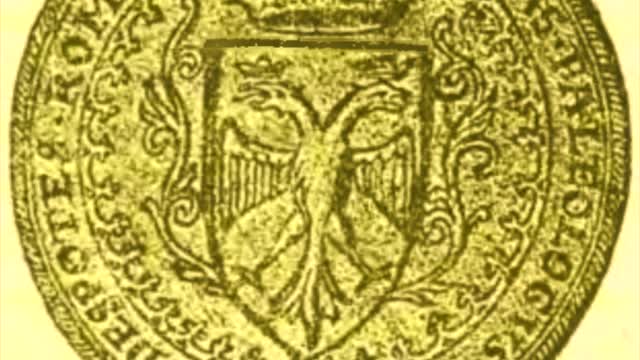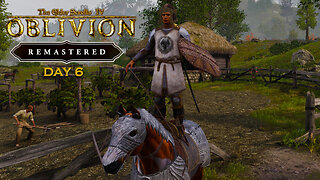Premium Only Content

BVLLA: ANDREAS PALEOLOGVS DEI GRATIA DESPOTES ROMEORVM
BVLLA: ANDREAS PALEOLOGVS DEI GRATIA DESPOTES ROMEORVM
http://zazzle.com/ProVaticanus
Byzantine-Roman seal of Andreas Palaiologos (*1453-†1502) in Western style Arms: (Gules) a crowned two-headed eagle (Or) Crown: An imperial crown Caption: ANDREAS PALEOLOGVS DEI GRATIA DESPOTES ROMEORVM (“Andreas Palaiologos, by the Grace of God, Despot of the Romans”.) As it was, the gates of the city were decorated with the arms of the Palaeologues and with crowned shields showing the two-headed eagle. During the Byzantine-Roman period, lead bullae (singular, Bulla) were widely used to seal and identify the sender of correspondence and containers in shipment. An iron, pliers-shaped instrument, a boulloterion, was used to impress the designs on a lead bulla seal. After the cord was wrapped around the package or document and the ends inserted in a channel in the blank seal, the seal was placed between the disc shaped engraved dies on the jaws of a boulloterion. The boulloterion had a projection above the jaws, which was struck with a hammer to impress the design on the seal and close the channel around the two ends of the cord. With a bulla in place a container cannot be violated without visible damage to either the bulla or the cord, ensuring the contents remain tamper-proof until they reach their destination.
Andreas Palaiologos or Palaeologus (Greek: Ἀνδρέας Παλαιολόγος; 17 January 1453 – June 1502), sometimes anglicized to Andrew, was the eldest son of Thomas Palaiologos, Despot of the Morea. Thomas was a brother of Constantine XI Palaiologos, the final Byzantine-Roman Emperor. After his father's death in 1465, Andreas was recognized as the titular Despot of the Morea and from 1483 onwards, he also claimed the title "Emperor of Constantinople" (Latin: Imperator Constantinopolitanus).*Note: Imperator Constantinopolitanus (Emperor of Constantinople) was the style used by Andreas in Latin-language documents. In Greek-language documents, he styled himself as Ἀνδρέας ἐν Χριστῷ τῷ Θεῷ πιστὸς βασιλεὺς καὶ αὐτοκράτωρ Ῥωμαίων ὁ Παλαιολόγος (Andreas in Christ the God, faithful Emperor and Autocrat of the Romans, the Palaiologos), a more traditional rendition of the Byzantine imperial title. After the fall of Constantinople in 1453 and the subsequent Ottoman invasion of the Morea in 1460, Andreas's father fled to Corfu with his family. After Thomas died in 1465, the then twelve-year-old Andreas moved to Rome and, as the eldest nephew of Constantine XI, became the head of the Palaiologos family and the chief claimant to the ancient imperial throne. Andreas's later use of the imperial title, never claimed by his father, was supported by some of the Byzantine refugees who lived in Italy and he hoped to one day restore the empire of his ancestors. Andreas married a Roman woman called Caterina. Though some primary sources allude to the possibility that he had children, there is no concrete evidence that Andreas left any descendants. As his stay in Rome continued, Andreas fell deeper into poverty. Although historians often blame his impoverished situation on a supposedly extravagant and irresponsible lifestyle, a more likely explanation is that the pension and funding provided to him by the papacy were regularly reduced. Andreas traveled around Europe several times in search of a ruler who could aid him in retaking Constantinople but rallied little support. The Ottoman Sultan Mehmed II, who had conquered Constantinople in 1453, died in 1481, and his two sons Cem and Bayezid fought a civil war over who would succeed him. Seeing his opportunity, Andreas attempted to organize an expedition in southern Italy during the summer of 1481 to cross the Adriatic Sea and restore the Byzantine-Roman Empire. The excursion was canceled in the autumn after Bayezid had successfully stabilized his rule. Although Andreas maintained hope of recapturing at least the Morea throughout his life, he never returned to Greece. Desperate for money, Andreas sold his rights to the Byzantine crown in 1494 to Charles VIII of France, who attempted to organize a crusade against the Ottomans. The sale was conditional on Charles, who Andreas hoped to use as a champion against the Ottomans, conquering the Morea and granting it to Andreas. When Charles died in 1498, Andreas once again claimed the imperial titles, using them until his death. He died in poverty in Rome in 1502 and was buried in St. Peter's Basilica. In his will, he granted his titles to Ferdinand II of Aragon and Isabella I of Castile.
Ago tibi gratias Deo per instrumenta de Tevvez pro bono rei publicae.
#RomanEmpire #Palaiologos #LumenSpei
-
 8:17
8:17
VSOGunChannel
14 hours ago $0.38 earnedYou Were Put on a Government Watch List || DECLASSIFIED
5.1K2 -
 35:14
35:14
Steph & Kayls
16 hours ago $0.34 earnedSpicing Things Up: How To Navigate Adding A Third To The Bedroom | Ep. 4
6.68K3 -
 28:59
28:59
Film Threat
11 hours agoTHUNDERBOLTS* EARLY REACTIONS | Film Threat After Dark
15.7K4 -
 8:02:12
8:02:12
Rebel News
4 days ago $211.98 earnedELECTION NIGHT LIVE: Rebel News Canada coverage with Ezra Levant, Sheila Gunn Reid & Special Guests
425K229 -
 1:24:54
1:24:54
Badlands Media
15 hours agoBaseless Conspiracies Ep. 130: Iberia Blackout, Green Energy Failures, and Grave-Robbing Government Experiments
83.5K31 -
 2:12:50
2:12:50
FreshandFit
8 hours agoModern Men VS Modern Women
53.8K33 -
 4:17:07
4:17:07
vivafrei
9 hours agoELECTIONS CANADA RESULTS LIVE STREAM WITH VIVA COMMENTARY!!!
132K145 -
 2:39:37
2:39:37
TimcastIRL
10 hours agoDemocrat LAUNCHES IMPEACHMENT Against Trump Citing Deportation, Abrego Garcia Case | Timcast IRL
172K149 -
 2:17:27
2:17:27
IcyFPS
8 hours agoA new legend rises.. Icy vs Teardrop | @playoffthegrid | Team MERC Grind |
31.9K2 -
 8:07:56
8:07:56
TwinGatz
10 hours ago🔴LIVE - Endless Jank | Oblivion Remastered
35.4K